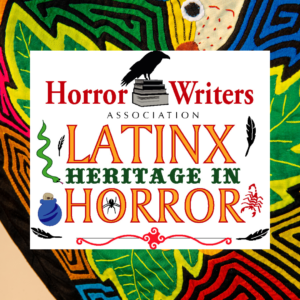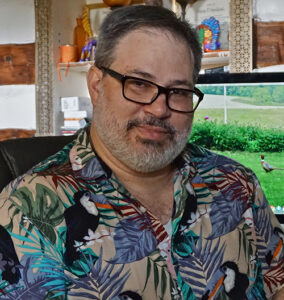Latinx Heritage in Horror: Interview with Karlo Yeager Rodriguez

 Karlo Yeager Rodriguez is from the enchanted isle of Puerto Rico, but moved to Balitmore, Maryland some years ago. He lives there with his partner and one very odd dog.
Karlo Yeager Rodriguez is from the enchanted isle of Puerto Rico, but moved to Balitmore, Maryland some years ago. He lives there with his partner and one very odd dog.
His work has appeared in Clowns: the Unlikely Coulrophobia Remix, Galaxy’s Edge #32 and Nature Magazine.
Connect with Karlo via his blog, alineofink.com or through Facebook at facebook.com/unalineanegra
What inspired you to start writing?
Reading. Really – I was an early reader, and was drawn from an early age to old fairy tales (Grimm and Hans Christian Andersen), which in their original forms always managed to contain elements of horror. I remember reading an illustrated version of The Tinderbox and being both frightened but unable to look away from the drawings of the three magical dogs in the story. However, I didn’t start writing fiction for publication until a decade ago. In a way, I feel lucky because with age I have more to say with my fiction.
What was it about the horror genre that drew you to it?
When people ask me this, I think back to an anecdote the late Peter Straub had where he as he was talking with a cousin, a tractor pulling a cart full of drunken partygoers rumbled by. Peter mentioned it looked like a tumbrel, whereupon his cousin asked, “what’s a tumbrel?” When Peter explained it, his cousin looked at him askance and said, “Oh, that’s why you’re that type of writer.”
I think most people who are drawn to horror tend to be honest about how fragile the world as we know it is, how close the things we fear are, even amid joy. Given how often I tend to think along the lines of worst-case scenarios, it was only a matter of time before I wandered into horror and made myself comfortable.
Do you make a conscious effort to include LatinX characters and themes in your writing and if so, what do you want to portray?
Yes. My most recent stories (Vanishing at Seize the Press Magazine, Got Your Nose at Pseudopod and All Good Children Come Out to Play, forthcoming in khoreo Magazine) have LatinX characters and engage with themes of immigration, militarism and the changes to grieving practices with assimilation. More recently, I’ve decided to write horror stories set in Puerto Rico, both past and present.
What has writing horror taught you about the world and yourself?
Maybe it’s a bit cliché but I often write to work through something that might be weighing upon me. More so with horror, which seems to be therapeutic for me, because acknowledging and grappling with how tenuous everything is ironically grants me a measure of serenity.
How have you seen the horror genre change over the years? And how do you think it will continue to evolve?
My first forays into horror were limited by what I could get in Puerto Rico, so I devoured most of what Stephen King had out by then. I was always looking for more stuff that would scratch that itch (Robert R. McCammon comes to mind) but it was slim pickings until I picked up an old paperback that had The Dunwich Horror. There was something so compelling about doomed Wilbur Whateley to my teenaged sensibilities, that I tried reading as much Lovecraft as I could find. It wasn’t until the mid-90s that I re-engaged with horror through a good friend who used to work at the local comic book store and ordered as much White Wolf as he could budget. This is how I stumbled across The Borderlands anthology series, Poppy Z. Brite, Kathe Koja and many others. These were stories that felt modern, expressing anxieties about urban decay spreading everywhere it mattered. I’ve been getting up to speed with recent stuff, which feels daunting but what’s great is that I’m seeing authors of all walks of life, races, genders and so on publishing.
How do you feel the LatinX community has been represented thus far in the genre and what hopes do you have for representation in the genre going forward?
As I hinted previously (with my recommendation of Quiroga) a lot of LatinX horror was unknown in anglophone spaces simply because there’s a tragic lack of interest in translations. There still is. This is getting better within the U.S. with more authors who identify as LatinX getting published, but the bulk of LatinX horror authors aren’t getting much of an audience in the U.S.
One detail I would feel remiss not mentioning: I grew up and am comfortable with the term – first “Latino/a” and more recently, “LatinX” – but what’s become clear is that the term itself flattens and erases a lot of other marginalized identities (such as BIPOC or Afro-Caribbean), as well as the alternative Spanish speakers may prefer, “Latine” (pronounced la-TIN-eh). It’s an ongoing conversation – much like the state of representation in the community.
Who are some of your favorite LatinX characters in horror?
Just a few recent ones would be:
Noemi from Mexican Gothic felt very well-drawn. Smart, resourceful and fearless when it comes to protecting her cousin, Catalina, but she still feels very much of her time.
Lisa Nova from Brand New Cherry Flavor was an outstanding character, willing to endure pain to achieve her goal: snatch her film back from the jaws of the Hollywood beast.
Marcos from Tender Is the Flesh is so broken by the blows life has dealt him, you can’t help but root for him even though in the world he lives, very little can ever end well.
Who are some LatinX horror authors you recommend our audience check out?
Gabino Iglesias, V. Castro, Cynthia Pelayo are doing great things in horror today. Nelly Geraldine García-Rosas has written fascinating “Aztec Mythos” and of course there’s Silvia Moreno-Garcia. For older stuff I can’t recommend Horacio Quiroga strongly enough.
What is one piece of advice you would give horror authors today?
Write what you want to write. Other people – sometimes people you love – may expect you to write what they would like to read, but unless you want to write that type of story don’t.
And to the LatinX writers out there who are just getting started, what advice would you give them?
If you can afford it, take your time. Be careful with yourself and don’t be afraid to take big swings in your fiction.



